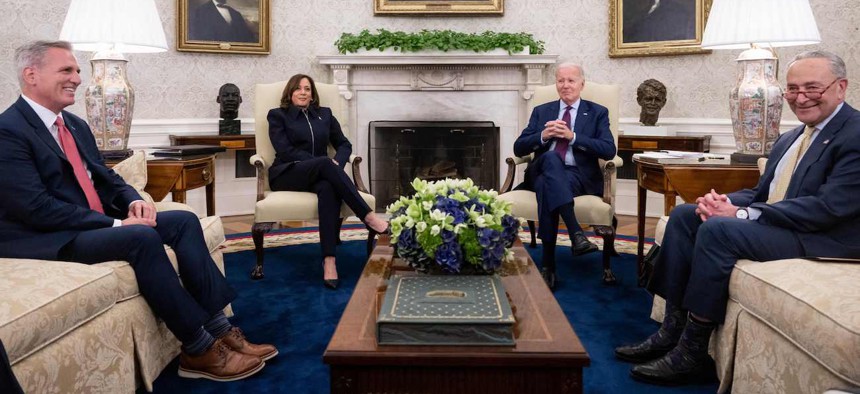
From left to right: Speaker of the House Kevin McCarthy, R-Calif., Vice President Kamala Harris, President Biden and Senate Majority Leader Chuck Schumer, D-N.Y., met in the Oval Office to continue negotiations over the debt ceiling on May 16, 2023. SAUL LOEB/Getty Images
With Just Weeks Until Potential Furloughs, Biden and McCarthy Hold 'Productive' Debt Talks
White House and congressional leaders conceded they remain significantly divided on key issues.
Top negotiators are elevating debt ceiling talks to a new level, the White House and congressional Republicans said on Tuesday, appointing individuals to reach an agreement before a deadline that could come as soon as June 1.
House Speaker Kevin McCarthy, R-Calif., said a White House meeting on Tuesday was “a little more productive” than one held last week, though the two sides remain “a long way apart.” The biggest step forward, he added, was both sides tapping aides or allies to carry on the conversations aimed at striking a bipartisan deal that would avoid an unprecedented default in the coming weeks.
Biden will let Office of Management and Budget Director Shalanda Young and Counselor to the President Steve Ricchetti lead the talks going forward, while McCarthy said Rep. Garret Graves, R-La., and the speaker’s staff will head up the Republican side. McCarthy stressed he was “not more optimistic,” noting Congress potentially has as few as 15 days to get a bill to Biden’s desk, but said he was happy to have a path for negotiations to continue.
“That doesn't mean we're going to get to an agreement. All it means is I think the process is better,” McCarthy said. “That gives us a structure to actually be more productive, but a short timeframe to get it done.”
The White House called the meeting “productive and direct” and said staff will continue to meet daily. Biden announced he would cut short his upcoming trip overseas to get back for negotiations.
“The president emphasized that while more work remains on a range of difficult issues, he’s optimistic that there is a path to a responsible, bipartisan budget agreement if both sides negotiate in good faith and recognize that neither side will get everything it wants,” the White House said in a statement.
The negotiations are expected to center on funding levels for the upcoming fiscal year and potential reforms to reduce federal spending in exchange for an increase in the debt limit. The White House has at times struck deals to place caps on federal spending in exchange for a hike or suspension of the debt limit, such as in 2019 under President Trump. That followed an agreement in 2011 in which President Obama agreed to 10-year budget caps.
House Republicans have demanded any debt ceiling increase be paired with dramatic cuts to spending at non-defense federal agencies and passed a bill to that effect last month. Biden and congressional Democrats previously refused to negotiate and demanded a “clean” debt limit increase without conditions. The Senate is not expected to take up the House’s bill, and the White House has said Biden would veto it. The Biden administration has warned the Republican plan would force furloughs across federal agencies and, in at least some cases, layoffs of federal workers.
Treasury Department Secretary Janet Yellen said earlier this month the government could default on its debts as soon as June 1, though cautioned the actual deadline could be “a number of weeks later.” The Bipartisan Policy Center, a think tank that focuses on budget and debt ceiling issues, has estimated that the “X date” on which the government will no longer have enough cash to meet its obligations will fall between early June and early August.
While economists and lawmakers have speculated about a range of outcomes if an unprecedented default were to occur, most have agreed the most likely scenario would require the Treasury to delay all government payments until it had enough money available to meet the demands of a given day. That would likely require federal employees to either face furloughs or work with only the promise of back pay once the situation was resolved. Agency payments to beneficiaries, states, grantees, contractors and, potentially, their own employees, would be disrupted. Treasury could pick and choose which payments to make each day, though officials have said that would present legal and operational challenges.
By June 12, according to BPC, Treasury would face an obligation of $6 billion in federal employee salaries. It is scheduled to make tens of billions of dollars in additional payments to Medicare, Medicaid, Social Security, defense vendors and other accounts.
In addition to overall spending levels, McCarthy has pushed Biden to agree to claw back unspent COVID-19 relief funds and to change eligibility requirements for certain federal programs aimed at low-income Americans.
“They have communicated in these meetings so we kind of know where everybody stands,” McCarthy said. “It gives us a good feel.” The speaker said negotiators need to reach an agreement by the end of the week to pass a bill by June 1, a goal he said is “possible” and “not that difficult.”
Senate Majority Leader Chuck Schumer, D-N.Y., called the meeting “much more cordial” than last week’s, noting all parties agreed Congress must pass a bipartisan bill and that default is “the worst alternative.”







